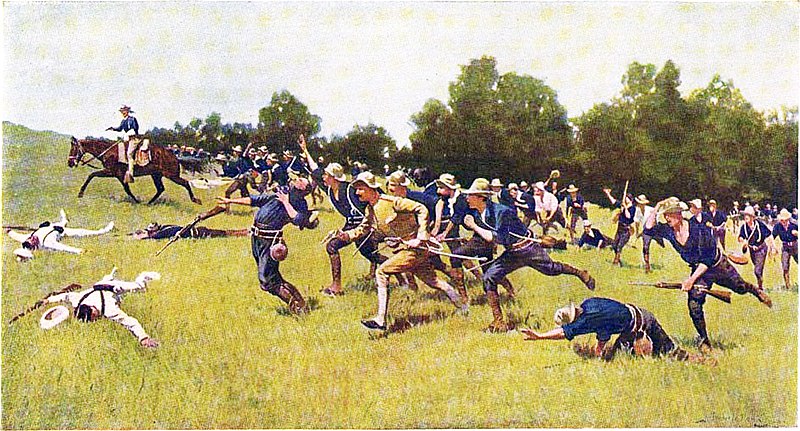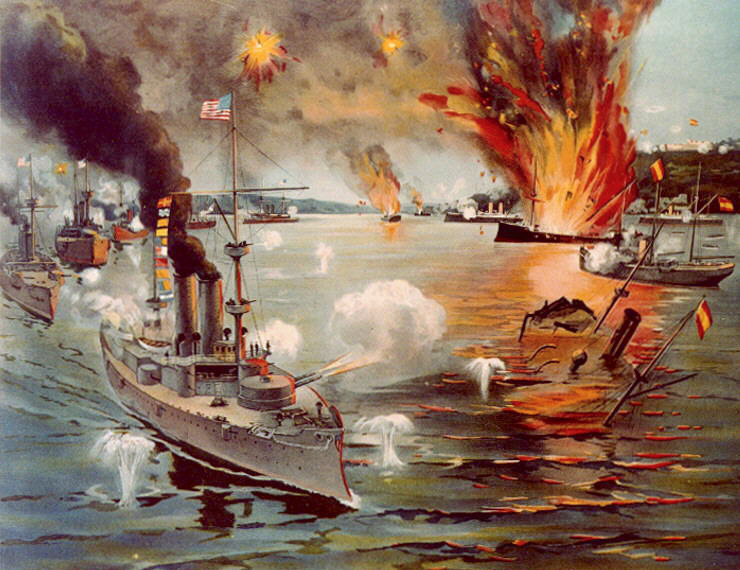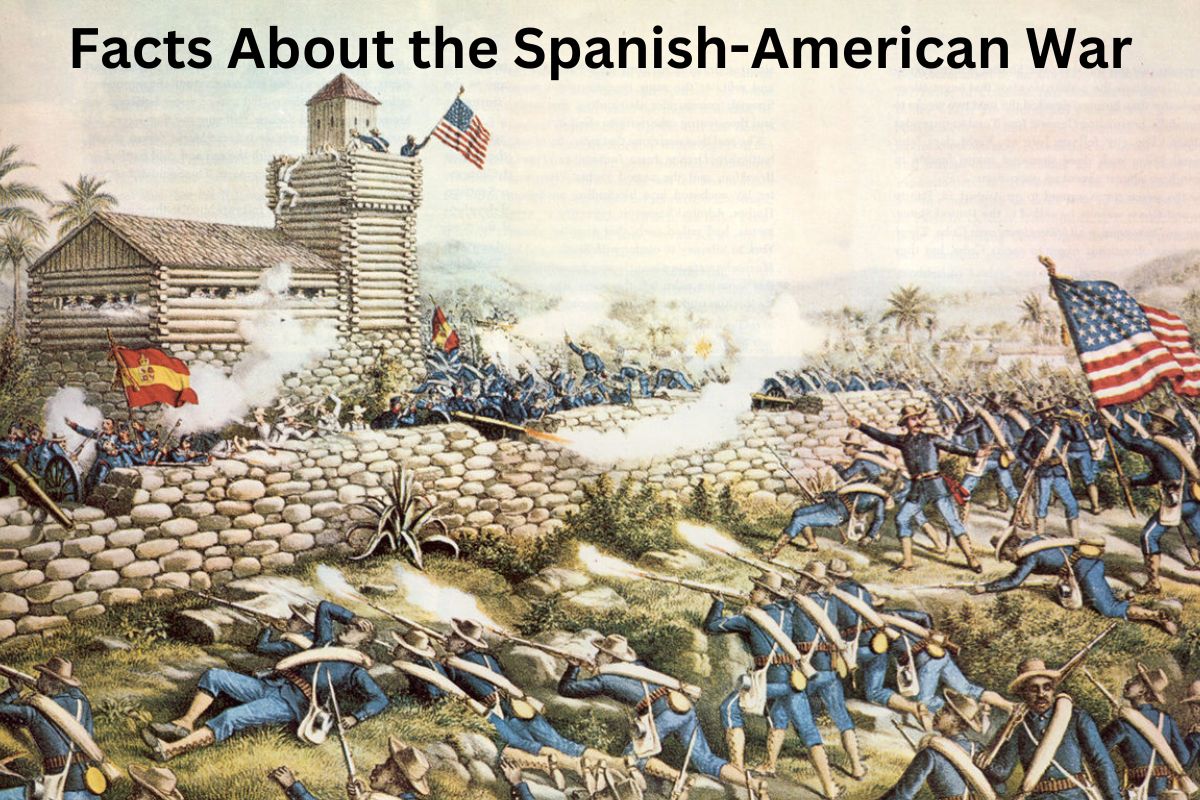The Spanish-American War, which took place from April to August 1898, was a significant conflict that shaped the course of history for both the United States and Spain.
It arose from tensions between the two nations and their involvement in the affairs of Cuba, which was then a Spanish colony seeking independence.
The war was primarily fought in two theaters: the Caribbean, centered around Cuba, and the Pacific, primarily in the Philippines.
The immediate cause of the conflict was the explosion of the USS Maine in Havana harbor, an event that heightened anti-Spanish sentiment in the United States.
The war had a profound impact on global geopolitics, as it marked the emergence of the United States as a world power and led to territorial changes and debates about imperialism.
The Spanish-American War showcased technological advancements, highlighted the roles of notable figures like Theodore Roosevelt, and had long-lasting consequences that shaped the trajectory of both nations involved.
Spanish American War Facts
1. The Spanish-American War took place from April to August 1898
The Spanish-American War took place from April to August 1898: The war officially began on April 25, 1898, when the United States declared war on Spain.
Also Read: History of Spain Facts
It lasted for approximately four months and ended with the signing of the Treaty of Paris on December 10, 1898. The conflict was relatively short compared to other wars.

2. The war was primarily fought between the United States and Spain
The war was primarily fought between the United States and Spain: The conflict primarily involved the United States, which sought to support Cuban rebels in their struggle for independence from Spain.
Also Read: Timeline of the Spanish-American War
Spain, on the other hand, aimed to maintain control over its colonial territories, including Cuba and the Philippines. While other nations were not directly involved in the fighting, the war garnered international attention and had implications for global geopolitics.
3. The immediate cause of the conflict was the explosion of the USS Maine in Havana harbor in February 1898
The immediate cause of the conflict was the explosion of the USS Maine: The USS Maine, a U.S. Navy battleship, exploded on February 15, 1898, while stationed in Havana harbor, Cuba. The explosion resulted in the deaths of 260 American sailors.
Although the exact cause of the explosion remains uncertain, the event provoked outrage in the United States, with many blaming Spain. This incident further strained the already tense relations between the two nations, ultimately leading to the outbreak of war.
4. The war was fought mainly in two theaters: the Caribbean, particularly around Cuba, and the Pacific, specifically in the Philippines
The war was fought mainly in two theaters: The conflict unfolded in two main geographic theaters. In the Caribbean theater, the United States launched a naval blockade of Cuba and conducted military operations primarily in and around the island.
The Pacific theater witnessed American efforts to neutralize Spanish influence in the Philippines. The Battle of Manila Bay, led by Commodore George Dewey, resulted in the defeat of the Spanish fleet and the capture of Manila.

5. The United States supported the Cuban rebels in their fight for independence from Spain
The United States supported the Cuban rebels in their fight for independence: The United States had been sympathetic to the Cuban independence movement, which had been engaged in a long struggle against Spanish colonial rule.
American newspapers played a crucial role in shaping public opinion by publishing sensationalized stories about Spanish atrocities in Cuba.
The sinking of the USS Maine intensified American support for the Cuban cause, leading to a decision to intervene militarily and aid the rebels in their fight for independence.
6. Famous figures such as Theodore Roosevelt and future President William McKinley played prominent roles in the conflict
Famous figures such as Theodore Roosevelt and future President William McKinley played prominent roles in the conflict: Theodore Roosevelt, at the time a lieutenant colonel, gained fame as the leader of the 1st United States Volunteer Cavalry, famously known as the Rough Riders.
Also Read: William McKinley Facts
His leadership and heroism during the Battle of San Juan Hill in Cuba earned him national recognition. William McKinley, the 25th President of the United States, played a significant role in the conflict as he made the decision to go to war with Spain and later oversaw the negotiations of the Treaty of Paris that ended the war.
7. The Spanish-American War was a relatively short and decisive conflict, with the United States emerging as the victor
The Spanish-American War was a relatively short and decisive conflict, with the United States emerging as the victor: The war itself lasted for approximately four months, from April to August 1898. Despite its brevity, the United States achieved decisive victories in both the Caribbean and the Pacific theaters.
The superior firepower and naval strength of the United States played a significant role in its success. The war resulted in Spain’s defeat and marked a turning point in American history, as it propelled the nation onto the world stage as a global power.
8. One of the most famous battles of the war was the Battle of San Juan Hill, fought in Cuba
One of the most famous battles of the war was the Battle of San Juan Hill, fought in Cuba: The Battle of San Juan Hill took place on July 1, 1898, during the larger Santiago Campaign in Cuba.
American forces, including Theodore Roosevelt’s Rough Riders, along with regular Army units, engaged Spanish troops entrenched on San Juan Heights.
The battle was intense and marked by close-quarter fighting. The combined efforts of the American forces resulted in the capture of the strategically important positions and contributed to the overall American victory in Cuba.
9. The war had a significant impact on the global stage
The war had a significant impact on the global stage, as it marked the emergence of the United States as a world power: Prior to the Spanish-American War, the United States was seen as a regional power with limited global influence.
However, the war showcased the capabilities of the U.S. military and demonstrated its ability to project power beyond its borders. The acquisition of overseas territories such as the Philippines, Puerto Rico, and Guam further solidified America’s status as a major player on the international stage.
10. As a result of the Treaty of Paris signed in December 1898, Spain ceded control of several territories
As a result of the Treaty of Paris signed in December 1898, Spain ceded control of several territories to the United States: The Treaty of Paris, signed on December 10, 1898, between the United States and Spain, ended the Spanish-American War.
Under the terms of the treaty, Spain relinquished control of Cuba, Puerto Rico, Guam, and the Philippines to the United States.
Cuba gained independence but became a de facto protectorate of the United States. The acquisition of these territories had far-reaching consequences, shaping U.S. foreign policy in the years to come and raising debates about imperialism and America’s role as a colonial power.
11. The acquisition of the Philippines led to an anti-imperialist movement in the United States
The acquisition of the Philippines led to an anti-imperialist movement in the United States: The United States’ acquisition of the Philippines as a result of the Treaty of Paris sparked a significant debate within the country.
Many Americans questioned the morality and legality of acquiring overseas territories and argued against American imperialism. This opposition gave rise to the anti-imperialist movement, which included prominent figures such as Mark Twain, Andrew Carnegie, and William Jennings Bryan.
Anti-imperialists believed that the United States should not engage in colonial expansion and should respect the principles of self-determination for other nations.
12. The war had a profound impact on Cuba, which gained independence from Spain
The war had a profound impact on Cuba: While the Spanish-American War resulted in Cuba’s liberation from Spanish colonial rule, the country’s independence was somewhat compromised.
Under the terms of the Platt Amendment, an amendment added to the Cuban constitution by the United States, the U.S. government maintained the right to intervene in Cuban affairs to protect its interests.
This provision limited Cuba’s sovereignty and influence over its own governance, effectively making it a de facto protectorate of the United States until 1902 when full independence was achieved.
13. The conflict also had implications for the Philippines, as the United States would face a subsequent conflict known as the Philippine-American War
The conflict also had implications for the Philippines: The acquisition of the Philippines by the United States was highly controversial and led to the Philippine-American War, which lasted from 1899 to 1902.
Filipinos, who had been fighting for their own independence from Spain, now found themselves facing a new colonial power.
The war resulted in significant casualties on both sides and a protracted insurgency against American rule. It was not until 1946 that the Philippines finally gained independence from the United States.
14. The war highlighted several technological advancements
The war highlighted several technological advancements: The Spanish-American War witnessed the use of various technological advancements on the battlefield. The introduction of armored ships, such as the USS Maine and the USS Oregon, showcased the increasing importance of naval power.
Wireless telegraphy, a relatively new technology at the time, played a vital role in communication and coordination during the conflict. Additionally, the deployment of the Gatling gun, an early form of machine gun, demonstrated the evolution of weaponry and its impact on warfare.
15. The Spanish-American War had long-lasting consequences for both the United States and Spain
The Spanish-American War had long-lasting consequences: The war marked a significant turning point in U.S. history and had far-reaching consequences. It propelled the United States onto the world stage as a global power and initiated a period of American imperialism.
The acquisition of new territories expanded the U.S. sphere of influence and set the stage for future conflicts and interventions in the Caribbean and the Pacific.
The war also stimulated debates about American foreign policy, imperialism, and the role of the United States in the world. Additionally, it influenced military strategy and technological developments, shaping the direction of future conflicts, such as World War I.
